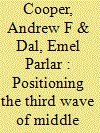|
|
|
Sort Order |
|
|
|
Items / Page
|
|
|
|
|
|
|
| Srl | Item |
| 1 |
ID:
151379


|
|
|
|
|
| Publication |
International Journal Vol: 71 No 4.
|
| Summary/Abstract |
This article argues that middle power diplomacy can be identified as having gone through three distinct waves. The first is connected with the immediate post-1945 global order, with a focus on multilateralism via the United Nations and related bodies. The second moved to ad hoc bursts of activism related to specific issue area niches. The third and current wave, by contrast, is embedded in the informal institutionalization associated with the G20. Just as the BRICS have used the G20 as a catalyst for differentiated activities both around and independent of the G20, the “missing middle” in the G20 (countries increasingly portrayed as middle powers beyond both the BRICS and the G7) have begun to explore the possibility of collective action. MIKTA (Mexico, Indonesia, Turkey, South Korea, and Australia), while possibly a significant advance in global governance, has the potential of hardening the categories of countries identified as middle powers. At the same time, the MIKTA countries face a number of serious constraints in terms of this global reach. Institutional elevation is compromised by practice limitations, most notably the hold of regional imperatives.
Keywords
|
|
|
|
|
|
|
|
|
|
|
|
|
|
|
|
| 2 |
ID:
170390


|
|
|
|
|
| Publication |
International Journal Vol: 71 No 4.
|
| Summary/Abstract |
This brief introduction elaborates on Marysia Zalewski's significant body of work over the past three decades, which provides not only ample evidence of the benefits of feminist modes of encountering world politics, but also a robust framework for enquiry for scholars of politics and international relations. Her work, while deeply rooted in feminist theories and practice, has implications which go far beyond disciplinary determinations and touch upon, as the symposium demonstrates, the empirics, and the impact of international politics writ large, from finance to terrorism to violence.
|
|
|
|
|
|
|
|
|
|
|
|
|
|
|
|
|
|
|
|
|